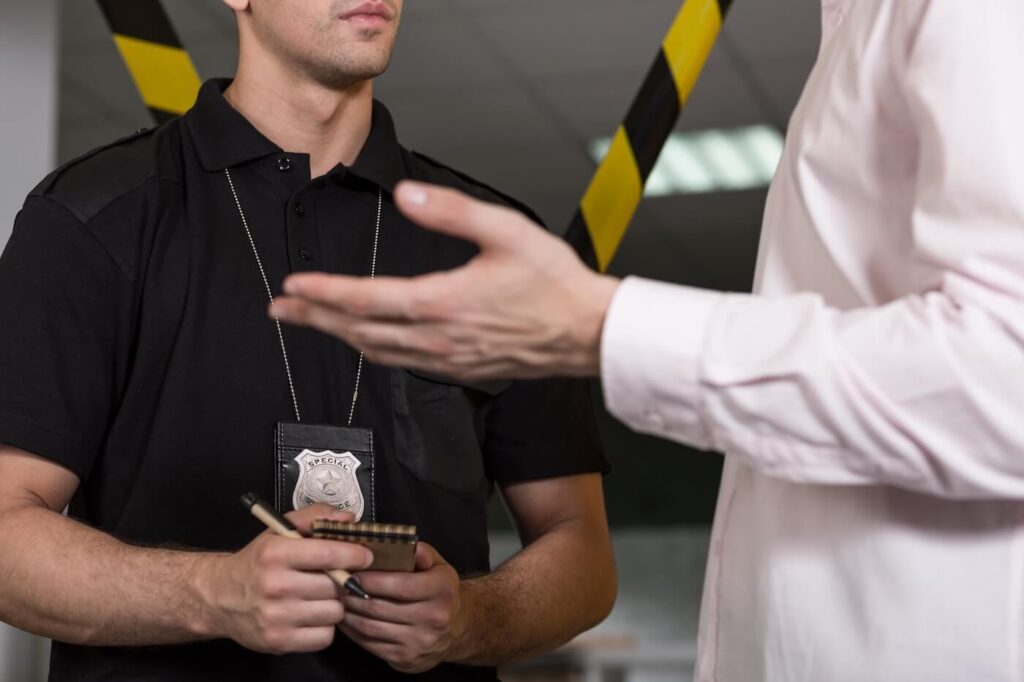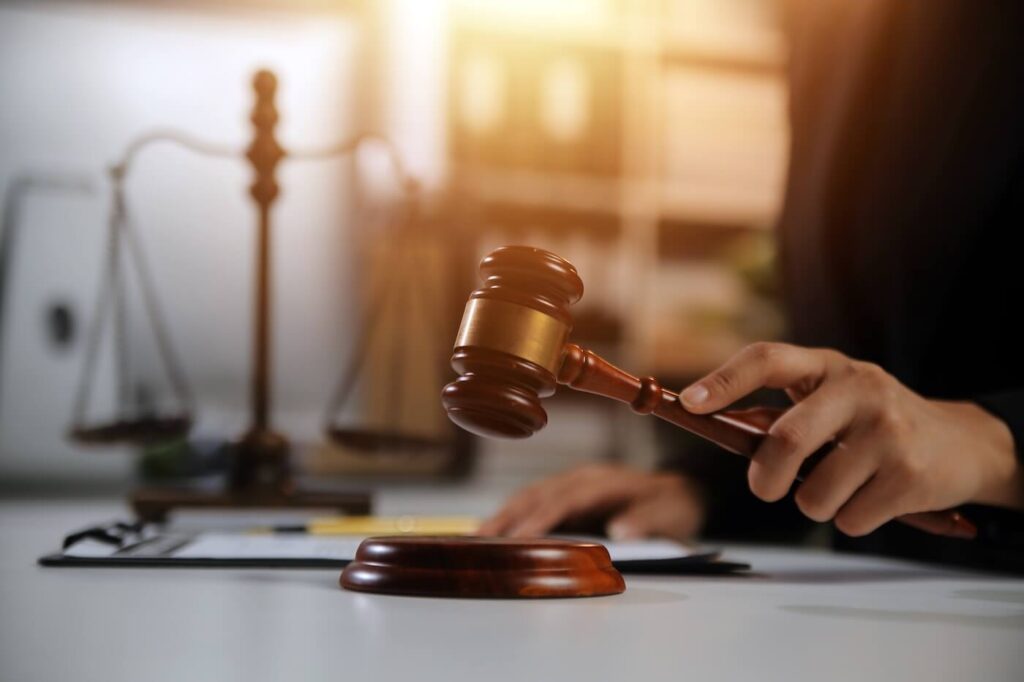By Josh Hamilton on

Domestic violence charges in Arizona carry serious consequences, ranging from restraining orders and incarceration to loss of child custody and firearm rights. The evidentiary threshold in these cases is generally lower than in other criminal cases due to the nature of intimate relationships and the circumstances in which these crimes allegedly occur.
Following domestic violence arrests, Arizona prosecutors must meet the burden of proving guilt beyond a reasonable doubt. At the Hernandez Hamilton Lamoureux PC, our domestic violence defense lawyers will challenge the prosecution’s evidence and aggressively defend your rights and freedom every step of the way.
Evidence Required for Domestic Violence Conviction in Arizona
Victim Statements and 911 Recordings
When a DV call is made to emergency services, the 911 recording becomes a key piece of evidence. Arizona courts generally consider these statements excited utterances under Arizona Rule of Evidence 803(2), which is an exception to the hearsay rule. These statements are admissible for proving domestic violence in court because they are made spontaneously during a startling event and are presumed to be more reliable.
In addition, if the victim gives a statement to responding officers at the scene, that statement is typically memorialized in the police report and may be recorded on body camera footage. These initial statements often form the basis of probable cause for arrest and charging decisions.
At the Hernandez Hamilton Lamoureux PC, our Arizona criminal defense attorneys may challenge the reliability of 911 calls or police-reported victim statements if they are inconsistent, influenced by intoxication, or contradicted by physical evidence.
Physical Injuries and Medical Records
Photographs of injuries taken by police officers or medical personnel constitute a standard part of domestic abuse evidence collection. Types of injuries may include:
- Bruises
- Lacerations
- Swelling
- Bite marks
- Scratches or abrasions
If the victim seeks medical attention, hospital records and doctors’ notes may also be subpoenaed by the prosecution. These records can corroborate or contradict claims made during the investigation.
Depending on the facts, our skilled Arizona criminal defense lawyers may challenge whether the injuries are consistent with the alleged narrative, whether the injuries could have been self-inflicted, or whether the injuries occurred at a different time than reported.
Body Camera and Dash Camera Footage
Arizona law enforcement agencies are now heavily reliant on body-worn cameras (BWCs) and dash-mounted cameras to document interactions during DV calls. These videos may capture:
- The demeanor of the alleged victim and the accused
- Visible injuries (or lack thereof)
- The presence of alcohol or drugs
- Statements made spontaneously
Video evidence can contradict written reports or highlight constitutional violations such as an illegal search, a coerced confession, or failure to administer Miranda warnings. Inconsistencies between the officer’s testimony and the footage may help our attorneys undermine credibility.
Witness Testimony
While DV cases typically occur in private, neighbors, roommates, family members, or children may have witnessed the incident or its aftermath. Police routinely canvas for third-party witnesses to provide corroboration.
Some witnesses may testify to past patterns of abuse, especially if a history of DV exists. This could be allowed under Arizona Rule of Evidence 404(b) (prior bad acts) if the court finds it relevant to proving motive, intent, or absence of mistake.

Our defense attorneys may argue bias, lack of firsthand knowledge, or improper admission of prejudicial prior acts. Witnesses may also be impeached if they change their stories or have ulterior motives.
Recorded Confessions or Interrogation Transcripts
If the accused is interrogated post-arrest, law enforcement will attempt to extract an admission or damaging statement. Any custodial interrogation must comply with Miranda v. Arizona, meaning that the suspect must be informed of their rights.
If Miranda warnings were not properly administered or if the defendant invoked their right to counsel but questioning continued, the statements may be inadmissible. Our defense lawyers may even challenge voluntary confessions if they were the product of coercion or manipulation.
Cell Phone Records, Texts, Emails, and Social Media
Digital communications between the accused and the alleged victim can be pivotal. These include:
- Threatening text messages
- Apologies or admissions
- Harassing emails
- Posts on social media platforms (Facebook, Instagram, X, etc.)
Prosecutors may subpoena cell phone records or obtain a search warrant to extract deleted messages or metadata.
Our defense counsel may challenge the authenticity, context, or completeness of these communications. It may also be possible to show that the messages were fabricated or taken out of context to appear incriminating.
Forensic Evidence
In more serious DV cases, particularly those involving allegations of sexual assault, attempted murder, or strangulation, forensic evidence may be collected. This could include:
- DNA evidence (from skin, hair, or bodily fluids)
- Fingerprints on weapons or objects
- Blood spatter analysis
- Toxicology reports
Arizona law enforcement may involve forensic pathologists, criminalists, or specialized labs depending on the nature of the alleged assault.
Forensic evidence must follow strict chain-of-custody protocols. Any break in that chain may render the evidence inadmissible. Moreover, our defense experts might offer alternative interpretations or challenge the methodology used.
Police Reports and Officer Testimony
The arresting officers will submit a detailed report outlining:
- The scene upon arrival
- Statements made by both parties
- Observations of injuries or property damage
- Any evidence collected
This report is the foundation upon which the prosecutor builds the case.
At the Hernandez Hamilton Lamoureux PC, our seasoned defense attorney will comb through the report for inconsistencies, omissions, or factual errors and cross-examine the officer accordingly.
Circumstantial and Contextual Evidence
Not all evidence in DV cases is direct. Prosecutors may introduce circumstantial evidence to establish the timeline, the nature of the relationship, or the defendant’s mental state. Examples include:
- Past 911 calls or police visits to the same address
- Prior protective orders
- Counseling or therapy records
- Evidence of substance abuse
Circumstantial evidence is typically ambiguous and subject to interpretation. Our defense team can argue lack of relevance or prejudice under Arizona Rule of Evidence 403.
Evidence Collection Challenges and Constitutional Considerations
Unlawful Search and Seizure
The Fourth Amendment protects against unreasonable searches and seizures. If police collect evidence from a home or phone without a valid warrant or without meeting an exception to the warrant requirement (e.g., exigency, consent), our defense attorneys may file a motion to suppress under the Exclusionary Rule.

Coerced Statements and Miranda Violations
Any statements obtained in violation of Miranda rights or through coercive tactics can be challenged under the Fifth Amendment. Statements made after invoking the right to remain silent or the right to counsel are particularly vulnerable.
Spousal Privilege and Hearsay Exceptions
While spousal testimonial privilege generally does not apply in DV cases under Arizona law, certain communications may be protected. Moreover, our criminal defense attorneys can challenge whether hearsay statements offered under exceptions (e.g., excited utterances) truly meet the criteria for admissibility.
How Our Arizona Criminal Defense Attorneys Challenge Evidence to Defend Against Domestic Violence Charges
At the Hernandez Hamilton Lamoureux PC, we aggressively investigate every aspect of the evidence presented by the state. Key defense strategies include:
- Challenging the chain of custody on physical or forensic evidence
- Filing motions to suppress unlawfully obtained statements or digital evidence
- Retaining private investigators to uncover alternative explanations or alibi witnesses
- Hiring forensic experts to dispute medical or scientific findings
- Exposing inconsistencies in the alleged victim’s story or past conduct
We also explore the broader context of the case, including whether:
- The accusations were made during a custody dispute
- The alleged victim had a motive to lie
- Self-defense was a legitimate factor
Why Choose Our Arizona Domestic Violence Defense Lawyers?
The Hernandez Hamilton Lamoureux PC brings over 100 years of collective experience, a nationally recognized reputation, and an unshakable commitment to defending your rights. When you are accused of domestic violence in Arizona, the stakes are too high to settle for anything less than the strongest defense.
Industry Recognition and Awards
- Top 100 Trial Lawyers – The National Trial Lawyers: Recognized among the most skilled trial attorneys in the country.
- AV Preeminent Rating – Martindale-Hubbell: A reflection of our ethical standards and legal ability, based on peer reviews.
- Ranked Among “Best Law Firms” – Best Lawyers: Acknowledged for consistent, high-quality legal work and client satisfaction.
- Super Lawyers Selection: Earned by fewer than 5% of attorneys nationwide for outstanding legal achievement.
- Featured in National Media: Our attorneys have been quoted and featured on ABC News, CBS, CNN, Fox News, and USA Today.
Extensive Criminal Trial Experience
For more than 30 years, the attorneys at our law firm have defended clients in some of the most complex and serious criminal cases across Arizona and 20 states nationwide. We have defended and won cases involving:
- Domestic violence
- Homicide
- Federal indictments
- High-profile investigations
Client-Centered, Results-Driven Approach
- Limited caseloads mean more time and focus on your case
- Team-based strategy ensures no detail is overlooked
- Access to top-tier experts, including forensic scientists, pathologists, and investigators
If you are facing domestic violence charges in Arizona, our defense team is determined to fight relentlessly for your freedom and reputation. To schedule your free consultation, call us 24/7 at 520-882-8823 or contact us online.
Back to Blog




